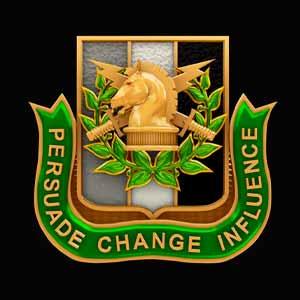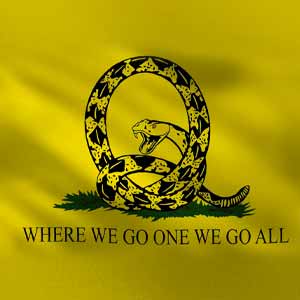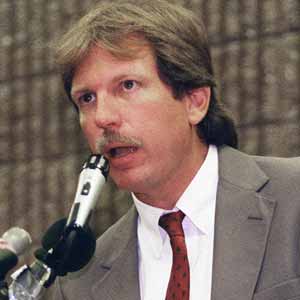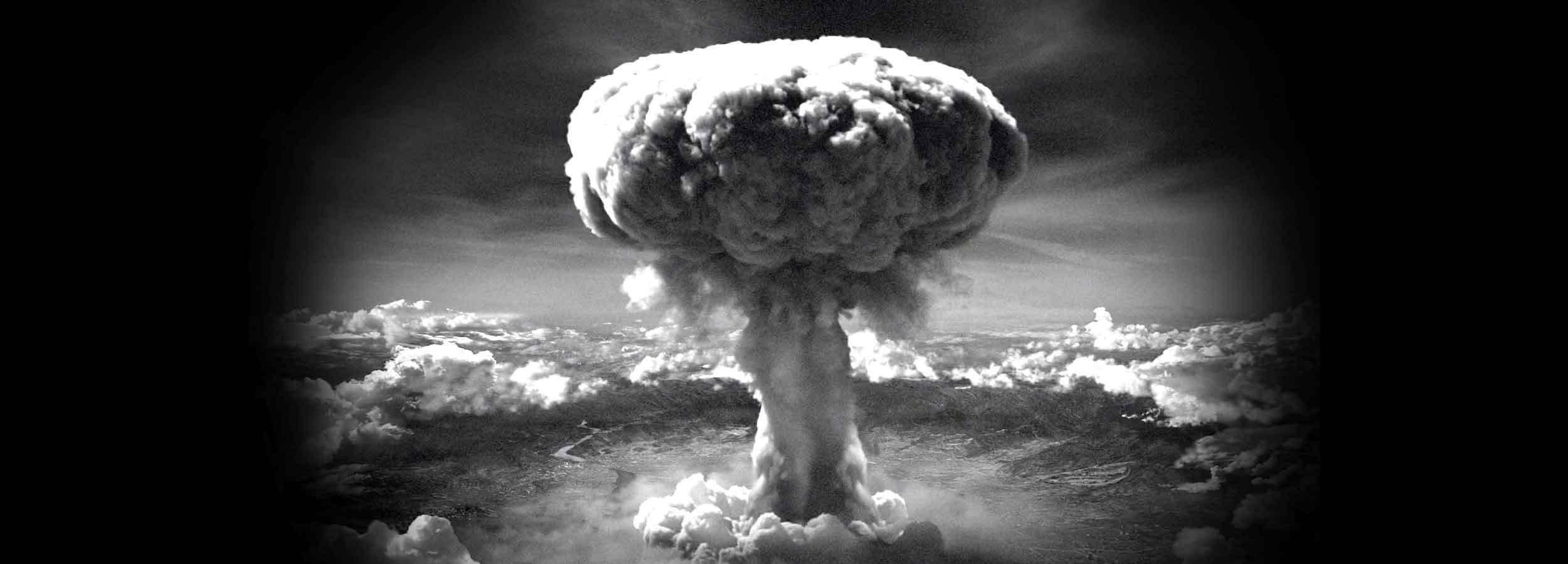
Should America Have Dropped Nuclear Bombs on Japan in World War 2?
Share this page:
Should America Have Dropped Nuclear Bombs on Japan in World War 2?
April 29th , 2024 | by Gunner Steele
Last week, Tucker Carlson was interviewed by Joe Rogan in a video that has already gone viral with millions of views even though the interview was over 3 hours long!
During this interview, Tucker made the claim that it was immoral for the United States government to have dropped atomic bombs on a civilian population in Hiroshima and Nagasaki in 1945 at the end of World War 2.
This apparently was a very controversial statement and it has created quite the firestorm in the last week. Here are Tucker's exact words:
Last week, Tucker Carlson was interviewed by Joe Rogan in a video that has already gone viral with millions of views even though the interview was over 3 hours long!
During this interview, Tucker made the claim that it was immoral for the United States government to have dropped atomic bombs on a civilian population in Hiroshima and Nagasaki in 1945 at the end of World War 2.
This apparently was a very controversial statement and it has created quite the firestorm in the last week. Here are Tucker's exact words:
Tucker makes an important point and he has sparked a valuable conversation to be had by "conservatives on the right." Generally speaking, Republicans, "patriots," and "conservatives" believe that the use of atomic weapons in World War 2 was not only justifiable, but that it was "the right thing to do."
Most Americans look back to the ending of World War 2 and America's victory in that war with pride and contentment. In fact, we have all been pretty much taught this way in government schools at least up until about the last 2 decades.
I myself have always believed that the use of atomic weapons, and specifically the dropping of these two bombs was a necessary evil because it "saved lives" and brought an end to the war. Of course, the concept of "saving lives" is better explained as though it saved more lives than it took and was therefore the morally superior option. That's what I had been taught, and I both accepted it and believed it.
However, years ago, a preacher changed my mind and I'd like to share with you what he shared with me. Because quite frankly, I'm ashamed of the fact that I ever supported or accepted such an atrocity.
Most Americans look back to the ending of World War 2 and America's victory in that war with pride and contentment. In fact, we have all been pretty much taught this way in government schools at least up until about the last 2 decades.
I myself have always believed that the use of atomic weapons, and specifically the dropping of these two bombs was a necessary evil because it "saved lives" and brought an end to the war. Of course, the concept of "saving lives" is better explained as though it saved more lives than it took and was therefore the morally superior option. That's what I had been taught, and I both accepted it and believed it.
However, years ago, a preacher changed my mind and I'd like to share with you what he shared with me. Because quite frankly, I'm ashamed of the fact that I ever supported or accepted such an atrocity.
The Controversy Amongst Conservatives
The popular talking heads amongst the ranks of "Conservative, Inc." have all been nearly universally chastising Tucker Carlson for his comments about dropping the atomic bombs. For example, Jeremy Boreing tweeted this in an obvious response to Tucker Carlson:
And both Steven Crowder and Ben Shapiro dedicated entire spots on their shows to attack Tucker for his opinion. You can see their podcasts below but in short, Steven Crowder claims that Tucker is wrong because Steven believes that Tucker is basing his argument on the premise that Japan was going to concede and end the war without the bomb anyway. Steven goes on to say that the Emperor of Japan plainly stated that he was not going to stop the war, and Steven and his gang go on to poke fun of it all by imitating the emperor of Japan saying, "No!"
The problem there, of course, is that Tucker's argument was a moral one and not one based on military strategy. Tucker wasn't arguing that the Japanese were "going to surrender anyway," he was arguing that indiscriminately murdering over 200,000 innocent civilians who were not participating in warfare, while subjecting the land to nuclear fallout that would make it unlivable for decades, was an immoral crime.
The problem there, of course, is that Tucker's argument was a moral one and not one based on military strategy. Tucker wasn't arguing that the Japanese were "going to surrender anyway," he was arguing that indiscriminately murdering over 200,000 innocent civilians who were not participating in warfare, while subjecting the land to nuclear fallout that would make it unlivable for decades, was an immoral crime.
Likewise Ben Shapiro attacked Tucker by using the common argument, which has been delivered to us as part of our own government's "official narrative," that, while the dropping of the atomic bombs was horrific, it was still morally superior to the only other option which would have led to millions of deaths. Unfortunately, Ben is using a "false dilemma," meaning that our leaders weren't stuck between making a choice between one of only two options—where one of them kills 200,000 innocent people and the other kills millions. That is simply a false premise and a giant lie.
But the real problem with this thinking, is the simple fact that decisions must be made based on MORAL TRUTH and not MORAL RELATIVISM. We don't commit an evil atrocity on the basis that it is LESS EVIL than another atrocity. We should not say, "Well relative to the other option of millions of people dying, I think it's better for us to kill 200,000 innocent civilians so that it scares the Japanese into surrendering."
We don't overlook government rape because it is less violent than government murder. We don't overlook government theft and say that it is less evil than government torture. Morals stand on their own. Either something is moral or it is not. If it is NOT MORAL, then it cannot be done, period.
And while the subject of war is often difficult, nuanced, and complicated—because WAR is horrible, ugly, and devastating, yet often it is necessary—the reality of war doesn't change the simplicity of morals. And morals come from God. And God has made it plain that the taking of human life can only be done morally for defense or for punishment—as in for a capital crime (De. 5:17, Ex. 20:13, Ex. 23:7, Le. 24:17, Ge. 9:6, Pr. 6:16-17, Ps. 82:4, Ro. 13:4, Pr. 25:26, Ne. 4:14, Ps. 18:39, 2 Sa. 22:40, Ps. 144:1, Es. 8:11). And in these instances you take the life of the person threatening you or the person committing the capital crime. You are never allowed to take INNOCENT LIFE.
But the real problem with this thinking, is the simple fact that decisions must be made based on MORAL TRUTH and not MORAL RELATIVISM. We don't commit an evil atrocity on the basis that it is LESS EVIL than another atrocity. We should not say, "Well relative to the other option of millions of people dying, I think it's better for us to kill 200,000 innocent civilians so that it scares the Japanese into surrendering."
We don't overlook government rape because it is less violent than government murder. We don't overlook government theft and say that it is less evil than government torture. Morals stand on their own. Either something is moral or it is not. If it is NOT MORAL, then it cannot be done, period.
And while the subject of war is often difficult, nuanced, and complicated—because WAR is horrible, ugly, and devastating, yet often it is necessary—the reality of war doesn't change the simplicity of morals. And morals come from God. And God has made it plain that the taking of human life can only be done morally for defense or for punishment—as in for a capital crime (De. 5:17, Ex. 20:13, Ex. 23:7, Le. 24:17, Ge. 9:6, Pr. 6:16-17, Ps. 82:4, Ro. 13:4, Pr. 25:26, Ne. 4:14, Ps. 18:39, 2 Sa. 22:40, Ps. 144:1, Es. 8:11). And in these instances you take the life of the person threatening you or the person committing the capital crime. You are never allowed to take INNOCENT LIFE.
Keep yourself far from a false matter; do not kill the innocent and righteous. For I will not justify the wicked. Exodus 23:7 (NKJV)
Isn't the "lesser of two evils" argument the same excuse that abortionists use? Even those who admit that abortion is the taking of innocent life—they justify it because its "less harmful" than forcing an "unwanted child" to be born and to force the mother to endure the suffering of childbirth and child-rearing. So rather than have the "horror" of a single mother carrying and birthing an "unwanted child," they claim we should just kill the innocent baby—which some admit is horrible, but that it is far less horrible than the latter option. You see, it's the same argument.
But abortion is wrong—no matter what. And it's wrong because it is the intentional killing of an innocent life. Period. It's just that simple. The context never matters. All that matters is the fact that killing innocent lives is immoral.
But abortion is wrong—no matter what. And it's wrong because it is the intentional killing of an innocent life. Period. It's just that simple. The context never matters. All that matters is the fact that killing innocent lives is immoral.
"…the LORD hates…Hands that shed innocent blood…" Proverbs 6:16-17 (NKJV)
And in the case of the use of nuclear weapons against Japan—it is not a very complicated decision to make once you have things in proper context and with a proper perspective. And here is the context you must have: America dropped nuclear bombs on innocent civilians and eradicated them from the face of the earth in an instant!
We did not use nuclear weapons on military installations. We did not use them against the Emperor in his palace. We didn't use them on a battlefield. Quite frankly if we had nuked a Japanese military base, I would have no problem with that because it is just in a war to take the lives of soldiers fighting against you.
But that's not what we did. No, we dropped those bombs on innocent Japanese citizens.
This would be like America's enemies coming to America and dropping nuclear bombs on Des Moines, Iowa and Lincoln, Nebraska where there are no military installations. Just a bunch of simple, innocent people—mostly farmers and families. For all we know a great number of people America killed on those 2 days were ideologically opposed to the war, and were political enemies of the Imperialist Japanese Regime. And America indiscriminately killed them anyhow—all just because they were Japanese citizens.
We did not use nuclear weapons on military installations. We did not use them against the Emperor in his palace. We didn't use them on a battlefield. Quite frankly if we had nuked a Japanese military base, I would have no problem with that because it is just in a war to take the lives of soldiers fighting against you.
But that's not what we did. No, we dropped those bombs on innocent Japanese citizens.
This would be like America's enemies coming to America and dropping nuclear bombs on Des Moines, Iowa and Lincoln, Nebraska where there are no military installations. Just a bunch of simple, innocent people—mostly farmers and families. For all we know a great number of people America killed on those 2 days were ideologically opposed to the war, and were political enemies of the Imperialist Japanese Regime. And America indiscriminately killed them anyhow—all just because they were Japanese citizens.
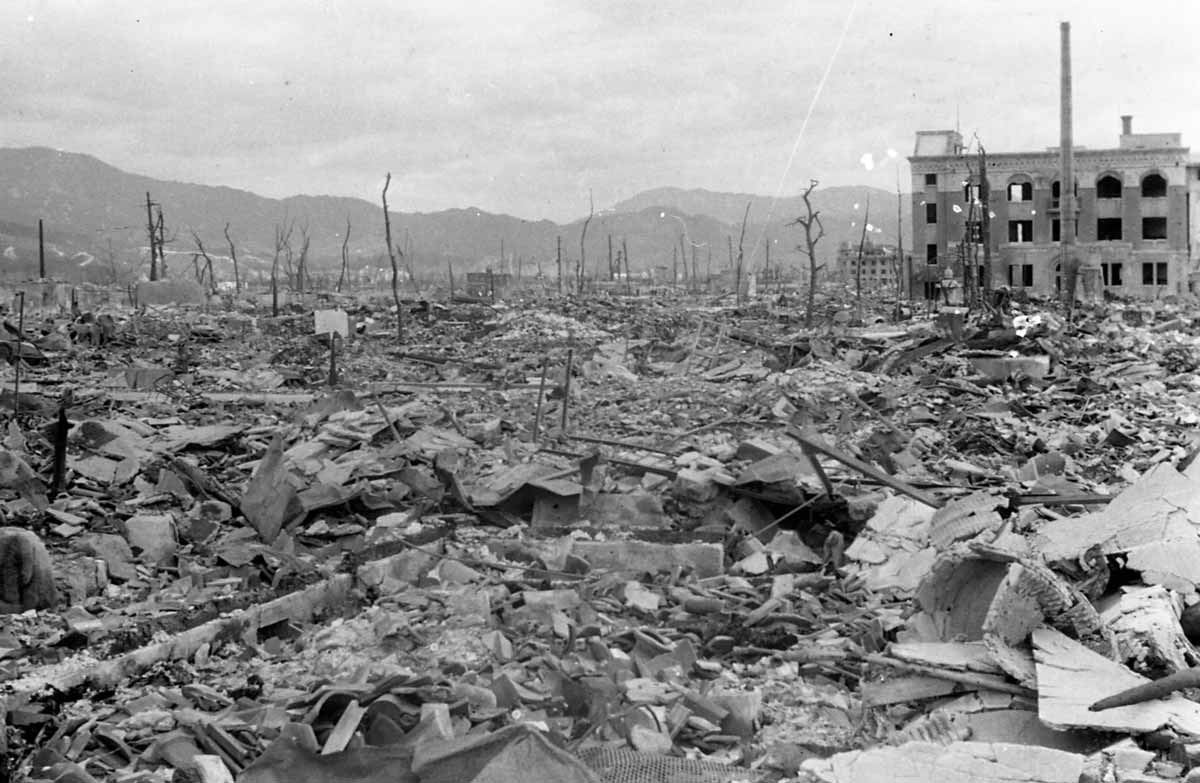
Hiroshima after the nuclear bomb. This used to be innocent Japanese families, houses, schools, and businesses. All of it was obliterated in an instant.
How can anybody justify that? And yet, that is exactly what conservatives who love the American military do all day long. As good puppets of the Military Industrial Complex, the average red Republican believes the American military can do no wrong.
It's remarkable how they can agree that the American government is incompetent in virtually every other area of life, but they have sold their souls unequivocally to the power and authority of the American Military Machine. Ignorant conservatives simply believe that anything America's military does is GOOD. But it's simply not true and there is no better example of this than the dropping of 2 weapons of mass destruction upon innocent lives in Japan.
Truly, there was never a single more horrific, gruesome, wicked, and evil atrocity committed by any person at any time in any single moment. And yes, ultimately the President of the United States at the time, Harry Truman, bears the guilt on his shoulders. But it would be impossible to relieve all of his accomplices from such guilt—including the pilots who flew the bombers and "pushed the button" which would end the lives of over 200,000 innocent men, women, children, babies, animals, trees, land, infrastructure, homes, and businesses, and would utterly devastate two cities and make then uninhabitable for decades.
It's remarkable how they can agree that the American government is incompetent in virtually every other area of life, but they have sold their souls unequivocally to the power and authority of the American Military Machine. Ignorant conservatives simply believe that anything America's military does is GOOD. But it's simply not true and there is no better example of this than the dropping of 2 weapons of mass destruction upon innocent lives in Japan.
Truly, there was never a single more horrific, gruesome, wicked, and evil atrocity committed by any person at any time in any single moment. And yes, ultimately the President of the United States at the time, Harry Truman, bears the guilt on his shoulders. But it would be impossible to relieve all of his accomplices from such guilt—including the pilots who flew the bombers and "pushed the button" which would end the lives of over 200,000 innocent men, women, children, babies, animals, trees, land, infrastructure, homes, and businesses, and would utterly devastate two cities and make then uninhabitable for decades.
The Facts that Persuaded Me:
Beyond the clear argument based on MORALS made above, a preacher friend shared the following historical facts with me years ago that completely changed my perspective about the use of atomic bombs in World War 2 and about World War 2 in general. These were things I never knew before and things I would imagine the vast majority of Americans do not know. Remember, the "official government narrative" is almost never true.
Did the Atomic Bombs Actually Save Lives?
I was taught that the U.S. dropped nuclear bombs on Hiroshima and Nagasaki in order to end WWII and save both American and Japanese lives. But most of the top American military officials at the time said otherwise. The U.S. Strategic Bombing Survey group, assigned by President Truman to study the air attacks on Japan, produced a report in July of 1946 that concluded: "Based on a detailed investigation of all the facts and supported by the testimony of the surviving Japanese leaders involved, it is the Survey's opinion that certainly prior to 31 December 1945 and in all probability, prior to 1 November 1945, Japan would have surrendered, even if the atomic bombs had not been dropped, even if Russia had not entered the war, and even if no invasion had been planned or contemplated."
Atomic Weapons Were Not Needed to End the War or to Save Lives
General Dwight Eisenhower (who later became one of our most beloved Presidents and who warned America about the military industrial complex), Supreme Commander of all Allied Forces, said: "The Japanese were ready to surrender and it wasn't necessary to hit them with that awful thing." (Newsweek, 11/11/63, Ike on Ike). Eisenhower also noted: "In July 1945, Secretary of War Stimson, visiting my headquarters in Germany, informed me that our government was preparing to drop an atomic bomb on Japan. I was one of those who felt that there were a number of cogent reasons to question the wisdom of such an act… I voiced to him my grave misgivings, first on the basis of my belief that Japan was already defeated and that dropping the bomb was completely unnecessary, and secondly because I thought that our country should avoid shocking world opinion by the use of a weapon whose employment was, I thought, no longer mandatory as a measure to save American lives. It was my belief that Japan was, at that very moment, seeking some way to surrender with a minimum loss of ‘face.' The Secretary was deeply perturbed by my attitude…"
Unnecessary and Unethical
Admiral William Leahy, the highest ranking member of the U.S. military from 1942 until retiring in 1949, who was the first de facto Chairman of the Joint Chiefs of Staff, wrote: "It is my opinion that the use of this barbarous weapon at Hiroshima and Nagasaki was of no material assistance in our war against Japan. The Japanese were already defeated and ready to surrender because of the effective sea blockade and the successful bombing with conventional weapons. The lethal possibilities of atomic warfare in the future are frightening. My own feeling was that in being the first to use it, we had adopted an ethical standard common to the barbarians of the Dark Ages. I was not taught to make war in that fashion, and wars cannot be won by destroying women and children."
No Military Justification
General Douglas MacArthur agreed: "MacArthur's views about the decision to drop the atomic bomb on Hiroshima and Nagasaki were starkly different from what the general public supposed…He saw no military justification for the dropping of the bomb. The war might have ended weeks earlier, if the United States had agreed, as it later did anyway, to the retention of the institution of the emperor."
The Potsdam Threat
The Potsdam Declaration, which was basically a demand (in the form of a military threat) that the United States sent to Japan in July 1945, demanded that Japan surrender unconditionally, or face "prompt and utter destruction." General Douglas MacArthur was appalled. He knew that the Japanese would never renounce their emperor, and that without the emperor an orderly transition to peace would be impossible anyhow, because his people would never submit to Allied occupation unless he ordered it. Ironically, when the surrender did come, it was conditional, and the condition was a continuation of the imperial reign. Had General MacArthur's advice been followed, the resort to atomic weapons at Hiroshima and Nagasaki would have been unnecessary.
Missed Opportunity
Assistant Secretary of War John McLoy noted: "I have always felt that if, in our ultimatum to the Japanese government issued from Potsdam (July 1945), we had referred to the retention of the emperor as a constitutional monarch and had made some reference to the reasonable accessibility of raw materials to the future Japanese government, it would have been accepted… We missed the opportunity of effecting a Japanese surrender, completely satisfactory to us, without the necessity of dropping the bombs."
The War was Already Won
Under Secretary of the Navy, Ralph Bird said: "The Japanese were ready for peace, and they already had approached the Russians and the Swiss. And that suggestion of giving a warning of the atomic bomb was a face-saving proposition for them, and one that they could have readily accepted. In my opinion, the Japanese war was really won before we ever used the atom bomb. Thus, it wouldn't have been necessary for us to disclose our nuclear position and stimulate the Russians to develop the same thing much more rapidly than they would have if we had not dropped the bomb… The Japanese were becoming weaker and weaker. They were surrounded by the Navy. They couldn't get any imports and they couldn't export anything. Naturally, as time went on and the war developed in our favour it was quite logical to hope and expect that, with the proper kind of a warning, the Japanese would then be in a position to make peace, which would have made it unnecessary for us to drop the bomb and bring Russia in." (War Was Really Won Before We Used A-Bomb, U.S. News and World Report, 8/15/60)
It Had Nothing to do with Ending the War
General Curtis LeMay, the tough cigar-smoking Army Air Force "hawk", stated publicly shortly after the nuclear bombs were dropped on Japan: "The war would have been over in two weeks…The atomic bomb had nothing to do with the end of the war at all."
No Invasion was Necessary
The Vice Chairman of the U.S. Bombing Survey Paul Nitze wrote: "I concluded that even without the atomic bomb, Japan was likely to surrender in a matter of months. My own view was that Japan would capitulate by November 1945. Even without the attacks on Hiroshima and Nagasaki, it seemed highly unlikely, given what we found to have been the mood of the Japanese government, that a U.S. invasion of the islands scheduled for 1 November 1945 would have been necessary."
Opening up Asia for Communism
Deputy Director of the Office of Naval Intelligence Ellis Zacharias wrote: "Just when the Japanese were ready to capitulate, we went ahead and introduced to the world the most devastating weapon it had ever seen and, in effect, gave the go-ahead to Russia to swarm over Eastern Asia. Washington decided it was time to use the A-bomb. I submit that it was the wrong decision. It was wrong on strategic grounds. And it was wrong on humanitarian grounds." (Ellis Zacharias, How We Bungled the Japanese Surrender, Look, 6/6/50)
Immoral and Unnecessary
Brigadier General Carter Clarke, the Military Intelligence officer in charge of preparing summaries of intercepted Japanese cables for President Truman and his advisors, said: "When we didn't need to do it, and we knew we didn't need to do it, and they knew that we knew we didn't need to do it, we used them as an experiment for two atomic bombs. Many other high-level military officers concurred. For example: The commander in chief of the U.S. Fleet and Chief of Naval Operations, Ernest J. King, stated that the naval blockade and prior bombing of Japan in March of 1945, had rendered the Japanese helpless and that the use of the atomic bomb was both unnecessary and immoral."
Targeting Civilians
Neither Hiroshima nor Nagasaki were deemed militarily vital by U.S. planners. (This is one of the reasons neither had been heavily bombed up to this point in the war.) Moreover, targeting at Hiroshima and Nagasaki was aimed explicitly on non-military facilities surrounded by workers' homes.
Historians Agree that the Bomb Wasn't Needed
Historians agree that nuclear weapons did not need to be used to stop the war or to save lives. As historian Doug Long notes: "U.S. Nuclear Regulatory Commission historian J. Samuel Walker writes, 'The consensus among scholars is that the bomb was not needed to avoid an invasion of Japan and to end the war within a relatively short time. It is clear that alternatives to the bomb existed and that Truman and his advisors knew it.'" (J. Samuel Walker, The Decision to Use the Bomb: A Historiographical Update, Diplomatic History, Winter 1990)
Even Scientists Opposed Using the Atom Bomb
Most of the Manhattan Project scientists, who developed the atom bomb, were opposed to using it on Japan. The scientists questioned the ability of destroying Japanese cities with atomic bombs to bring surrender when destroying Japanese cities with conventional bombs had not done so. They recommended a demonstration of the atomic bomb in an unpopulated area of Japan.
Official Protest
On 11 August 1945, the Japanese government filed an official protest over the atomic bombing to the U.S. State Department through the Swiss Legation in Tokyo, observing: "Combatant and non-combatant men and women, old and young, are massacred without discrimination by the atmospheric pressure of the explosion, as well as by the radiating heat which result therefrom. Consequently there is involved a bomb having the most cruel effects humanity has ever known…The bombs in question, used by the Americans, by their cruelty and by their terrorizing effects, surpass by far gas or any other arm, the use of which is prohibited. Japanese protests against U.S. desecration of international principles of war paired the use of the atomic bomb with the earlier firebombing, which massacred old people, women and children, destroying and burning down Shinto and Buddhist temples, schools, hospitals, living quarters, etc. They now use this new bomb, having an uncontrollable and cruel effect much greater than any other arms or projectiles ever used to date. This constitutes a new crime against humanity and civilization."
Conservatives Opposed the Atom Bomb as Immoral
University of Maryland professor of political economy, and former Legislative Director in the U.S. House of Representatives and the U.S. Senate, and Special Assistant in the Department of State, Gar Alperovitz declared: "Though most Americans are unaware of the fact, increasing numbers of historians now recognize the United States did not need to use the atomic bomb to end the war against Japan in 1945. Moreover, this essential judgment was expressed by the vast majority of top American military leaders in all three services in the years after the war ended: Army, Navy and Air Force. Nor was this the judgment of 'liberals', as is sometimes thought today. In fact, leading conservatives were far more outspoken in challenging the decision as unjustified and immoral than American liberals in the years following World War II."
Unnecessary
The most illuminating perspective, however, comes from top World War II American military leaders. The conventional wisdom that the atomic bomb saved a million lives is so widespread that most Americans haven't paused to ponder something rather striking to anyone seriously concerned with the issue: Not only did most top U.S. military leaders think the bombings were unnecessary and unjustified, many were morally offended by what they regarded as the unnecessary destruction of Japanese cities and what were essentially noncombat populations. Moreover, they spoke about it quite openly and publicly.
And to add to all of that, here's an interesting scripture to ponder in relation to the dropping of the Atomic bombs:
"When you besiege a city for a long time while making war against it to take it, you shall not destroy its trees…" Deuteronomy 20:19
So people are taking sides, what side do you come down on? Let me know in the comments below…
Did the Atomic Bombs Actually Save Lives?
I was taught that the U.S. dropped nuclear bombs on Hiroshima and Nagasaki in order to end WWII and save both American and Japanese lives. But most of the top American military officials at the time said otherwise. The U.S. Strategic Bombing Survey group, assigned by President Truman to study the air attacks on Japan, produced a report in July of 1946 that concluded: "Based on a detailed investigation of all the facts and supported by the testimony of the surviving Japanese leaders involved, it is the Survey's opinion that certainly prior to 31 December 1945 and in all probability, prior to 1 November 1945, Japan would have surrendered, even if the atomic bombs had not been dropped, even if Russia had not entered the war, and even if no invasion had been planned or contemplated."
Atomic Weapons Were Not Needed to End the War or to Save Lives
General Dwight Eisenhower (who later became one of our most beloved Presidents and who warned America about the military industrial complex), Supreme Commander of all Allied Forces, said: "The Japanese were ready to surrender and it wasn't necessary to hit them with that awful thing." (Newsweek, 11/11/63, Ike on Ike). Eisenhower also noted: "In July 1945, Secretary of War Stimson, visiting my headquarters in Germany, informed me that our government was preparing to drop an atomic bomb on Japan. I was one of those who felt that there were a number of cogent reasons to question the wisdom of such an act… I voiced to him my grave misgivings, first on the basis of my belief that Japan was already defeated and that dropping the bomb was completely unnecessary, and secondly because I thought that our country should avoid shocking world opinion by the use of a weapon whose employment was, I thought, no longer mandatory as a measure to save American lives. It was my belief that Japan was, at that very moment, seeking some way to surrender with a minimum loss of ‘face.' The Secretary was deeply perturbed by my attitude…"
Unnecessary and Unethical
Admiral William Leahy, the highest ranking member of the U.S. military from 1942 until retiring in 1949, who was the first de facto Chairman of the Joint Chiefs of Staff, wrote: "It is my opinion that the use of this barbarous weapon at Hiroshima and Nagasaki was of no material assistance in our war against Japan. The Japanese were already defeated and ready to surrender because of the effective sea blockade and the successful bombing with conventional weapons. The lethal possibilities of atomic warfare in the future are frightening. My own feeling was that in being the first to use it, we had adopted an ethical standard common to the barbarians of the Dark Ages. I was not taught to make war in that fashion, and wars cannot be won by destroying women and children."
No Military Justification
General Douglas MacArthur agreed: "MacArthur's views about the decision to drop the atomic bomb on Hiroshima and Nagasaki were starkly different from what the general public supposed…He saw no military justification for the dropping of the bomb. The war might have ended weeks earlier, if the United States had agreed, as it later did anyway, to the retention of the institution of the emperor."
The Potsdam Threat
The Potsdam Declaration, which was basically a demand (in the form of a military threat) that the United States sent to Japan in July 1945, demanded that Japan surrender unconditionally, or face "prompt and utter destruction." General Douglas MacArthur was appalled. He knew that the Japanese would never renounce their emperor, and that without the emperor an orderly transition to peace would be impossible anyhow, because his people would never submit to Allied occupation unless he ordered it. Ironically, when the surrender did come, it was conditional, and the condition was a continuation of the imperial reign. Had General MacArthur's advice been followed, the resort to atomic weapons at Hiroshima and Nagasaki would have been unnecessary.
Missed Opportunity
Assistant Secretary of War John McLoy noted: "I have always felt that if, in our ultimatum to the Japanese government issued from Potsdam (July 1945), we had referred to the retention of the emperor as a constitutional monarch and had made some reference to the reasonable accessibility of raw materials to the future Japanese government, it would have been accepted… We missed the opportunity of effecting a Japanese surrender, completely satisfactory to us, without the necessity of dropping the bombs."
The War was Already Won
Under Secretary of the Navy, Ralph Bird said: "The Japanese were ready for peace, and they already had approached the Russians and the Swiss. And that suggestion of giving a warning of the atomic bomb was a face-saving proposition for them, and one that they could have readily accepted. In my opinion, the Japanese war was really won before we ever used the atom bomb. Thus, it wouldn't have been necessary for us to disclose our nuclear position and stimulate the Russians to develop the same thing much more rapidly than they would have if we had not dropped the bomb… The Japanese were becoming weaker and weaker. They were surrounded by the Navy. They couldn't get any imports and they couldn't export anything. Naturally, as time went on and the war developed in our favour it was quite logical to hope and expect that, with the proper kind of a warning, the Japanese would then be in a position to make peace, which would have made it unnecessary for us to drop the bomb and bring Russia in." (War Was Really Won Before We Used A-Bomb, U.S. News and World Report, 8/15/60)
It Had Nothing to do with Ending the War
General Curtis LeMay, the tough cigar-smoking Army Air Force "hawk", stated publicly shortly after the nuclear bombs were dropped on Japan: "The war would have been over in two weeks…The atomic bomb had nothing to do with the end of the war at all."
No Invasion was Necessary
The Vice Chairman of the U.S. Bombing Survey Paul Nitze wrote: "I concluded that even without the atomic bomb, Japan was likely to surrender in a matter of months. My own view was that Japan would capitulate by November 1945. Even without the attacks on Hiroshima and Nagasaki, it seemed highly unlikely, given what we found to have been the mood of the Japanese government, that a U.S. invasion of the islands scheduled for 1 November 1945 would have been necessary."
Opening up Asia for Communism
Deputy Director of the Office of Naval Intelligence Ellis Zacharias wrote: "Just when the Japanese were ready to capitulate, we went ahead and introduced to the world the most devastating weapon it had ever seen and, in effect, gave the go-ahead to Russia to swarm over Eastern Asia. Washington decided it was time to use the A-bomb. I submit that it was the wrong decision. It was wrong on strategic grounds. And it was wrong on humanitarian grounds." (Ellis Zacharias, How We Bungled the Japanese Surrender, Look, 6/6/50)
Immoral and Unnecessary
Brigadier General Carter Clarke, the Military Intelligence officer in charge of preparing summaries of intercepted Japanese cables for President Truman and his advisors, said: "When we didn't need to do it, and we knew we didn't need to do it, and they knew that we knew we didn't need to do it, we used them as an experiment for two atomic bombs. Many other high-level military officers concurred. For example: The commander in chief of the U.S. Fleet and Chief of Naval Operations, Ernest J. King, stated that the naval blockade and prior bombing of Japan in March of 1945, had rendered the Japanese helpless and that the use of the atomic bomb was both unnecessary and immoral."
Targeting Civilians
Neither Hiroshima nor Nagasaki were deemed militarily vital by U.S. planners. (This is one of the reasons neither had been heavily bombed up to this point in the war.) Moreover, targeting at Hiroshima and Nagasaki was aimed explicitly on non-military facilities surrounded by workers' homes.
Historians Agree that the Bomb Wasn't Needed
Historians agree that nuclear weapons did not need to be used to stop the war or to save lives. As historian Doug Long notes: "U.S. Nuclear Regulatory Commission historian J. Samuel Walker writes, 'The consensus among scholars is that the bomb was not needed to avoid an invasion of Japan and to end the war within a relatively short time. It is clear that alternatives to the bomb existed and that Truman and his advisors knew it.'" (J. Samuel Walker, The Decision to Use the Bomb: A Historiographical Update, Diplomatic History, Winter 1990)
Even Scientists Opposed Using the Atom Bomb
Most of the Manhattan Project scientists, who developed the atom bomb, were opposed to using it on Japan. The scientists questioned the ability of destroying Japanese cities with atomic bombs to bring surrender when destroying Japanese cities with conventional bombs had not done so. They recommended a demonstration of the atomic bomb in an unpopulated area of Japan.
Official Protest
On 11 August 1945, the Japanese government filed an official protest over the atomic bombing to the U.S. State Department through the Swiss Legation in Tokyo, observing: "Combatant and non-combatant men and women, old and young, are massacred without discrimination by the atmospheric pressure of the explosion, as well as by the radiating heat which result therefrom. Consequently there is involved a bomb having the most cruel effects humanity has ever known…The bombs in question, used by the Americans, by their cruelty and by their terrorizing effects, surpass by far gas or any other arm, the use of which is prohibited. Japanese protests against U.S. desecration of international principles of war paired the use of the atomic bomb with the earlier firebombing, which massacred old people, women and children, destroying and burning down Shinto and Buddhist temples, schools, hospitals, living quarters, etc. They now use this new bomb, having an uncontrollable and cruel effect much greater than any other arms or projectiles ever used to date. This constitutes a new crime against humanity and civilization."
Conservatives Opposed the Atom Bomb as Immoral
University of Maryland professor of political economy, and former Legislative Director in the U.S. House of Representatives and the U.S. Senate, and Special Assistant in the Department of State, Gar Alperovitz declared: "Though most Americans are unaware of the fact, increasing numbers of historians now recognize the United States did not need to use the atomic bomb to end the war against Japan in 1945. Moreover, this essential judgment was expressed by the vast majority of top American military leaders in all three services in the years after the war ended: Army, Navy and Air Force. Nor was this the judgment of 'liberals', as is sometimes thought today. In fact, leading conservatives were far more outspoken in challenging the decision as unjustified and immoral than American liberals in the years following World War II."
Unnecessary
The most illuminating perspective, however, comes from top World War II American military leaders. The conventional wisdom that the atomic bomb saved a million lives is so widespread that most Americans haven't paused to ponder something rather striking to anyone seriously concerned with the issue: Not only did most top U.S. military leaders think the bombings were unnecessary and unjustified, many were morally offended by what they regarded as the unnecessary destruction of Japanese cities and what were essentially noncombat populations. Moreover, they spoke about it quite openly and publicly.
And to add to all of that, here's an interesting scripture to ponder in relation to the dropping of the Atomic bombs:
"When you besiege a city for a long time while making war against it to take it, you shall not destroy its trees…" Deuteronomy 20:19
So people are taking sides, what side do you come down on? Let me know in the comments below…
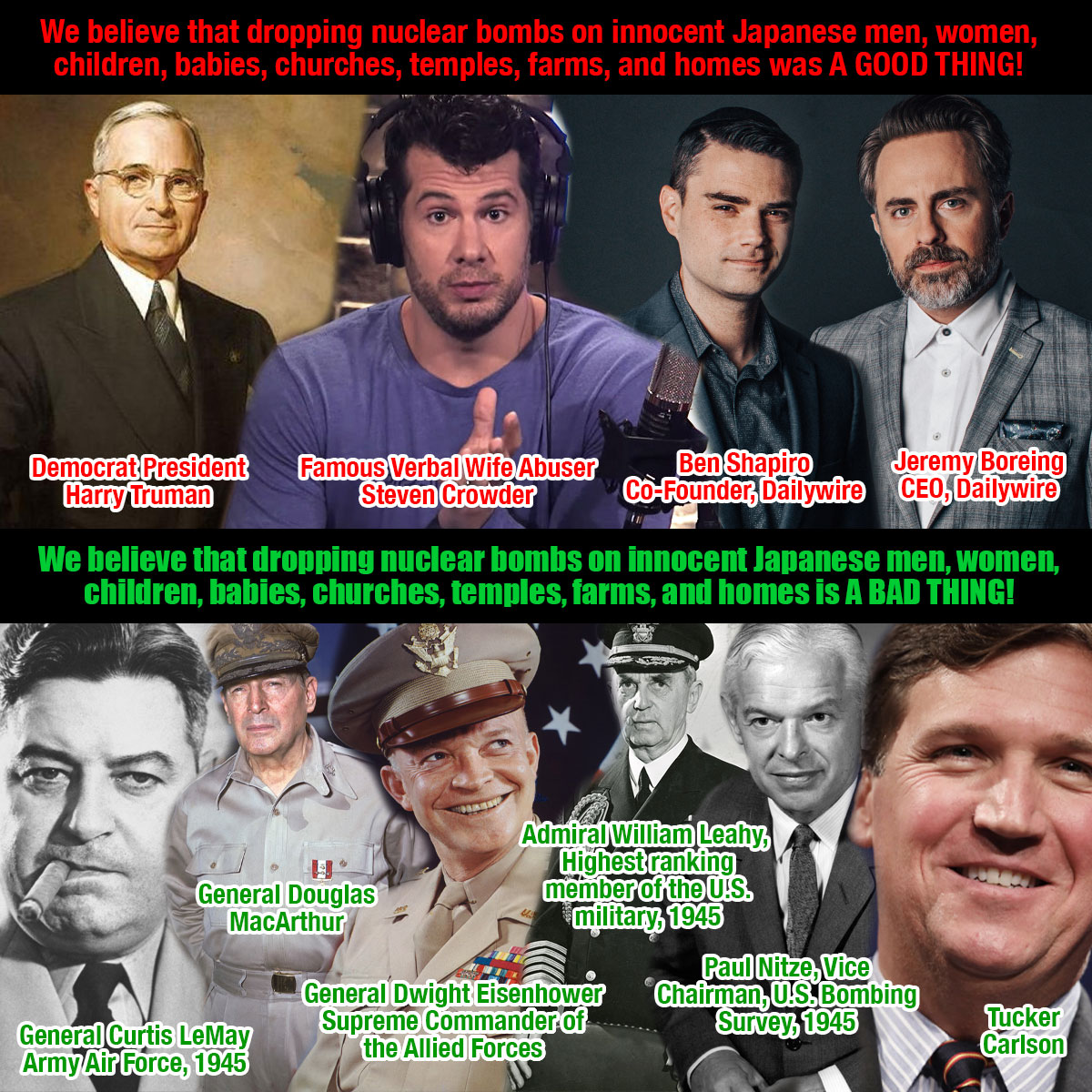

P.S. Much credit goes to Dr. Peter Hammond of Frontline Fellowship who first shared these truths with me. You can see a presentation he has given about this topic here, and a sermon here.
Popular COVID-19 Related Articles:
COVID Put Your Heart on Display
America's Kryptonite is Trump's Achilles' Heel
The Great Scam of 2020
ONGOING LIST: Abuse of Power, Government Overreach, and Unconstitutional Force
List of Fake News and Propaganda About COVID-19
Christians Response to Coronavirus is Shameful
COVID Put Your Heart on Display
America's Kryptonite is Trump's Achilles' Heel
The Great Scam of 2020
ONGOING LIST: Abuse of Power, Government Overreach, and Unconstitutional Force
List of Fake News and Propaganda About COVID-19
Christians Response to Coronavirus is Shameful
SITE SECURED BY:



